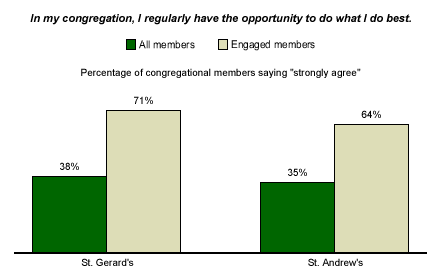Second in a two-part series
In order to feel connected with their religious congregations, members must feel that they are making meaningful contributions. St. Gerard Majella, a large Roman Catholic parish in the northeast, and St. Andrew's, a suburban, mainline Protestant church in the Midwest, have been working on improving engagement among their members. In both congregations, the percentage of members who "strongly agree" that they have the opportunity to do what they do best in their congregations is substantially higher among engaged members than among members overall.

What are some ways leaders can use this insight to actively build congregational engagement? The following are strategies that congregations have used effectively to increase the number of opportunities for members to do what they do best as part of their faith communities.
Help Members Identify What They Naturally Do Best
Many members simply do not know what they naturally do best. The notion of "fixing" weaknesses is so prevalent in our society that many, if not most, of us can more readily identify what we don't do well rather than what we do well.
Some churches have begun using talent assessments to help members identify their areas of greatest talent. One such assessment tool is the Clifton StrengthsFinder, which Gallup uses to identify individuals' top five "themes of talent" in the course of building strengths-based organizations. While there are other assessments on the market, the point is that as many members as possible need to feel they're contributing in ways that reflect who they are as individuals.
Simply having a more profound understanding of the other members of an organization can also strengthen emotional connections among the group. Members of St. Gerard Majella took the Clifton StrengthsFinder, and pictures of each member with their top five themes of talent are posted in the entry of the church. "People stop and ask what this is," says the Rev. Bill Hanson of St. Gerard Majella. "And then when they find out, they want to do it, too. It's created a lot of enthusiasm in our parish, and people start relating to each other differently. It's been a tremendous spiritual growth experience for us."
The benefits of discovering and relating personal insights are particularly evident in small-group settings. St. Andrew's has developed a six-week class for members based on the Clifton StrengthsFinder that explores the spirituality of their greatest talents. The class has been especially effective in engaging new members; St. Andrew's Pastor Tony Dawson says it's like "fast-tracking" members so they become engaged much faster. "Our most engaged new members come out of that class," he says. After taking the class, they "dive in" right away, quickly achieving a level of engagement that takes much longer among members who haven't participated.
Coaching: Going to the Next Level
Many churches have also found that giving members one-on-one feedback about their talents effectively encourages them to act on their talents and find their specific "mission" within the life of the congregation.
Some congregations use trained coaches to give feedback to their members. One congregation has monthly "coaching nights" in which coaches schedule one-hour sessions with members who have taken the Clifton StrengthsFinder. On a typical coaching night, eight coaches are available from 7 p.m. to 8 p.m. and 8 p.m. to 9 p.m. "We do this all in the same room, with coaches at round tables, so it doesn't feel like a counseling or therapy session," says Joe Franz, the program's coordinator. "It also creates a kind of excitement and unity about the process that has some great benefits."
These are just a few of the possible strategies religious leaders can use to help their members do what they do best. The resulting increase in engagement will greatly improve the spiritual health of the entire faith community.
The SE25 items are protected by copyright of The Gallup Organization, Princeton, NJ, 2001. All rights reserved.
